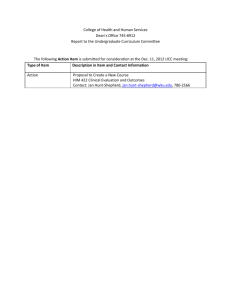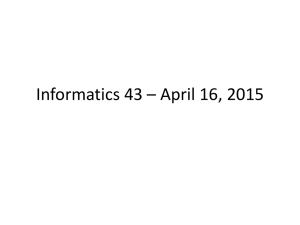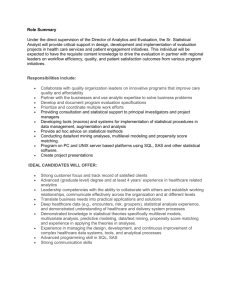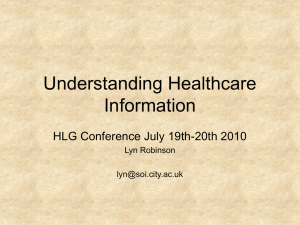HMI 7510 - Introduction to Healthcare
advertisement
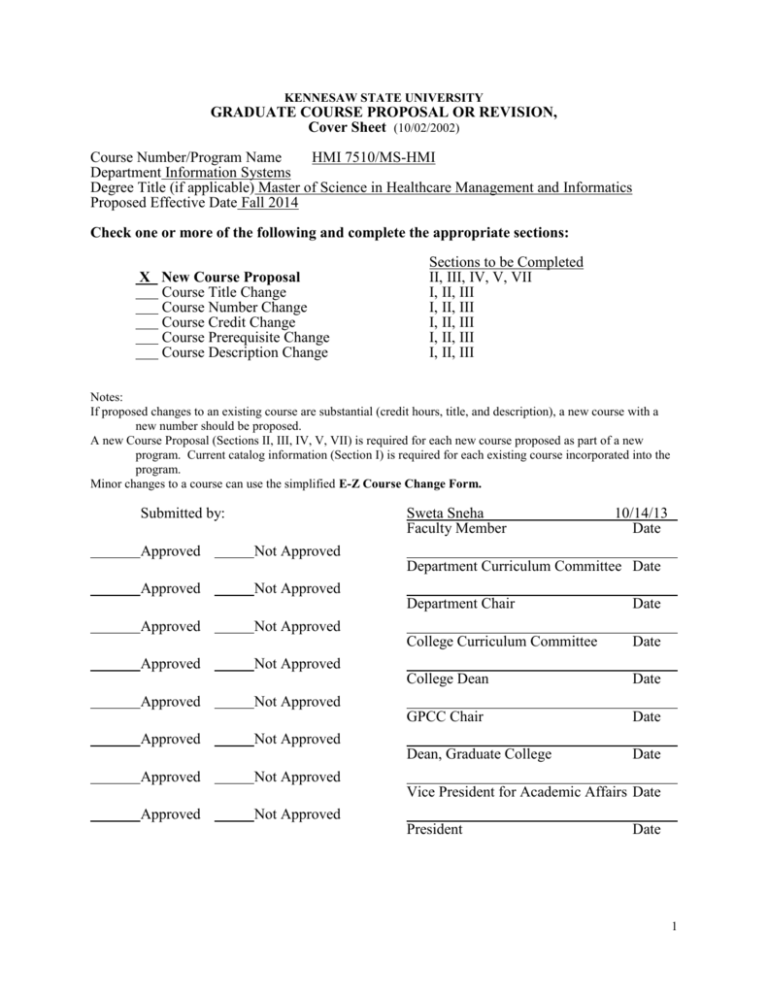
KENNESAW STATE UNIVERSITY GRADUATE COURSE PROPOSAL OR REVISION, Cover Sheet (10/02/2002) Course Number/Program Name HMI 7510/MS-HMI Department Information Systems Degree Title (if applicable) Master of Science in Healthcare Management and Informatics Proposed Effective Date Fall 2014 Check one or more of the following and complete the appropriate sections: X New Course Proposal Course Title Change Course Number Change Course Credit Change Course Prerequisite Change Course Description Change Sections to be Completed II, III, IV, V, VII I, II, III I, II, III I, II, III I, II, III I, II, III Notes: If proposed changes to an existing course are substantial (credit hours, title, and description), a new course with a new number should be proposed. A new Course Proposal (Sections II, III, IV, V, VII) is required for each new course proposed as part of a new program. Current catalog information (Section I) is required for each existing course incorporated into the program. Minor changes to a course can use the simplified E-Z Course Change Form. Submitted by: Approved Sweta Sneha Faculty Member 10/14/13 Date Not Approved Department Curriculum Committee Date Approved Approved Approved Approved Approved Approved Not Approved Department Chair Date College Curriculum Committee Date College Dean Date GPCC Chair Date Dean, Graduate College Date Not Approved Not Approved Not Approved Not Approved Not Approved Vice President for Academic Affairs Date Approved Not Approved President Date 1 KENNESAW STATE UNIVERSITY GRADUATE COURSE/CONCENTRATION/PROGRAM CHANGE I. Current Information (Fill in for changes) Page Number in Current Catalog Course Prefix and Number Course Title Credit Hours Prerequisites Description (or Current Degree Requirements) II. Proposed Information (Fill in for changes and new courses) Course Prefix and Number HMI 7510 Course Title Introduction to Healthcare Management and Informatics Credit Hours 3 Prerequisites Full admission to the MS-HMI program or permission of the graduate program director Description (or Proposed Degree Requirements) This class will provide an overview of the current landscape of healthcare; introduce the role of information systems in healthcare; emphasize the use of clinically motivated use of information technology for quality, efficient, delivery and practice of healthcare; the management challenges in the current healthcare landscape; and the profound role and impact of informatics. An examination of how information is captured, converted, and stored in machine readable form and used in the various facets of the health care system; the impact of Electronic Medical Record (EMR); and personalized medicine will also be examined. III. Justification In 2009, Dr. David Blumenthal, the National Coordinator for Health Information Technology, estimated a need for an additional 50,000 individuals trained to meet President Barack Obama's goal of all Americans having their medical records in electronic format by 2014. The needs are equally strong beyond the US in the rest of the world and for professionals beyond physicians and nurses (external link). A critical focus was placed on training Health IT workforce via curriculum development, community college training programs etc. (external link). The proposal of the new graduate program in Healthcare Management and Informatics (MS-HMI) is a response of Coles College of Business to meet the market needs of the thriving Health-IT sector locally (in the greater Atlanta area – also see Appendix A in the program proposal for further details), nationally, and globally. In order to ensure the quality of the proposed graduate program, the design and curricular components are based on the nationally accepted standards set up by the Commission on Accreditation for Health Informatics and Information Management Education (CAHIM). The proposed curriculum 2 integrates the domains of the practice and delivery of healthcare, information technology, computing, data analytics, and leadership/management principles. This collaborative approach allows our graduates to understand the complexity and interdependencies among relationships that must be considered when making technology and management decisions within a healthcare organization. The proposed course, HMI 7510, is an integral part of the proposed graduate program. It aims to provide a foundation to build the workforce that will enable innovative uses of IT in clinical/healthcare setting to improve the quality, safety, and cost-effectiveness of healthcare/public health. A succinct health management and informatics strategy is critical to ensuring improved patient outcomes and the quality of patient care; secured information access; and enhanced decision making within/across organizations in the healthcare domain. 3 IV. Additional Information (for New Courses only) Instructor: Dr. Sweta Sneha Text: Health Care Information Systems: A Practical Approach for Health Care Management, 2nd Edition - Karen A. Wager, Frances W. Lee, John P. Glaser. ISBN: 978-0-470-38780-1. Health Informatics: Practical Guide for Healthcare and Information Technology Professionals, Fifth Edition 2012 Robert E. Hoyt MD - Editor Ann Yoshihashi MD, Nora Bailey- Associate Editor Additional readings consisting of relevant cases and articles will be provided to the students by the instructor Prerequisites: Full admission to the MS-HMI program or permission of the graduate program director Objectives: Understand the current healthcare environment, opportunities, and challenges locally and globally Understand the role of IT, computing, and informatics in enabling efficient, quality healthcare Understand implementation and evaluation of EHR (Electronic Health Record) and EMR (Electronic Medical Record) Understand meaningful use, standards, interoperability, security/privacy of data in the context of healthcare Understand Healthcare Informatics and Imaging Informatics Understand Translational and Personalized medicine Instructional Method This class will use the Socratic method of instruction. The instructor will encourage students to explore other points of view through case study analysis, in-depth discussions, and evaluation of principles underlying healthcare management and informatics Method of Evaluation Students will be evaluated using case studies, tests, discussions, and research reports. These assignments will be graded based on adequacy of literature reviews, quality of discussions, timeliness of submissions, and thoroughness of responses to objective and subjective questions. V. Resources and Funding Required (New Courses only) We plan to hire a part-time instructor to teach an additional course at the rate of $3000 so that existing faculty can be reassigned to teach HMI 7510. No additional cost is anticipated. Resource Amount Faculty Other Personnel Equipment $3000 4 Supplies Travel New Books New Journals Other (Specify) TOTAL $3000 Funding Required Beyond Normal Departmental Growth VI. COURSE MASTER FORM This form will be completed by the requesting department and will be sent to the Office of the Registrar once the course has been approved by the Office of the President. The form is required for all new courses. DISCIPLINE COURSE NUMBER COURSE TITLE FOR LABEL Informatics (Note: Limit 30 spaces) CLASS-LAB-CREDIT HOURS Approval, Effective Term Grades Allowed (Regular or S/U) If course used to satisfy CPC, what areas? Learning Support Programs courses which are required as prerequisites Information Systems HMI 7510 Introduction to Healthcare Management and 3-0-3 Fall 2014 Regular APPROVED: ________________________________________________ Vice President for Academic Affairs or Designee __ 5 VII Attach Syllabus KENNESAW STATE UNIVERSITY DEPARTMENT OF INFORMATION SYSTEMS HMI - 7510, Introduction to Healthcare Management and Informatics Course Description: Prerequisites: Textbook and Resources: This class will provide an overview of the current landscape of healthcare; introduce the role of information systems in healthcare; emphasize the use of clinically motivated use of information technology for quality, efficient, delivery and practice of healthcare; the management challenges in the current healthcare landscape; and the profound role and impact of informatics. An examination of how information is captured, converted, and stored in machine readable form and used in the various facets of the health care system; the impact of Electronic Medical Record (EMR); and personalized medicine will also be examined. A succinct health management and informatics strategy is critical to ensuring improved patient outcomes and the quality of patient care; secured information access; and enhanced decision making within/across organizations in the healthcare domain. Admission to the MS-HMI Program or permission of the MSHMI Program Director. Health Care Information Systems: A Practical Approach for Health Care Management, 2nd Edition - Karen A. Wager, Frances W. Lee, John P. Glaser. ISBN: 978-0-470-38780-1. Health Informatics: Practical Guide for Healthcare and Information Technology Professionals, Fifth Edition 2012 Robert E. Hoyt MD - Editor Ann Yoshihashi MD, Nora Bailey- Associate Editor Additional readings consisting of relevant cases and articles will be provided to the students by the instructor Instructor: Dr. Sweta Sneha Office: CL 3011 Email Address: ssneha@kennesaw.edu Phone: 678-797-2436 Learning Outcomes: As a result of completing this course, students will be able to: 6 Understand the current healthcare environment, opportunities, and challenges locally and globally Understand the role of IT, computing, and informatics in enabling efficient, quality healthcare Understand implementation and evaluation of EHR and EMR Understand meaningful use, standards, interoperability, security/privacy of data in the context of healthcare Understand Healthcare Informatics and Imaging Informatics Understand Translational and Personalized medicine TENTATIVE COURSE SCHEDULE: SUBJECT TO CHANGE Week Topic Chapters/Assignments 1 Introduction to Course Overview of Medical Informatics Ch 1 2 Health data, information, knowledge Ch 2 Electronic Health Records Ch 3 3 Practice Management Systems Ch 4 Health Information Exchange Ch 5 4 Data Standards Ch 6 Architecture of Information Systems Ch 7 5 Health Information Privacy Ch 8 Health Information Security Ch 9 6 Consumer Health Informatics Ethics Ch 10 Consumer Health Informatics Assignment #1 7 Mobile Technology Ch 11 M-Health 8 Online Medical Resources Ch 12 Search Engines Ch 13 9 Evidence Based Medicine, Clinical Practice Ch 14 Guidelines Disease Management and Disease Registries Ch 15 10 Exam 1 Exam 1 Assignment #2 Assignment #2 11 Quality Improvement Strategies Ch 16 Patient Safety and Health Information Technology Ch 17 12 Electronic Prescribing Ch 18 Telehealth and Telemedicine Ch 19 13 Picture Archiving and Communication Systems Ch 20 Bioinformatics CH 21 14 Public Health Informatics Ch 22 E-Research Ch 23 7 15 Project Presentations Final Exam Final Project Final Exam ASSIGNMENTS: Assignment #1 & 2: Case Study Write-up Students will complete individual case studies on Healthcare Organizations that have utilized IT and informatics for effective healthcare delivery and practice. Students will evaluate how well these companies handled the projects, including the consideration of management, the role of IT, the role of informatics, and the impact on the organization post adoption. Case studies will be evaluated on thoughtfulness of responses, completeness of the assignment, and timeliness of the submissions. Exam 1 & Final Exam Based on the readings and classroom discussions, the exam may include a combination of multiple-choice, short answer and/or essay questions. Final Projects Students must complete a course project. The goal of the project is to identify an informatics problem at your practice or work and propose a solution based on what is known from informatics research and best practice. If you do not have access to a health care setting, you can do the project in another setting, such as a company or organization. The instructor can help if you have a challenge with this. The problem and solution should be written into a succinct document that should include references that justify the framing of the problem and the proposed solutions. Students will present their project to their colleagues at the in-person session that they attend. ASSESSMENT: Assignment #1 Assignment #2 Exam 1 Final Exam Project Total 20% 20% 20% 20% 20% 100% 8
